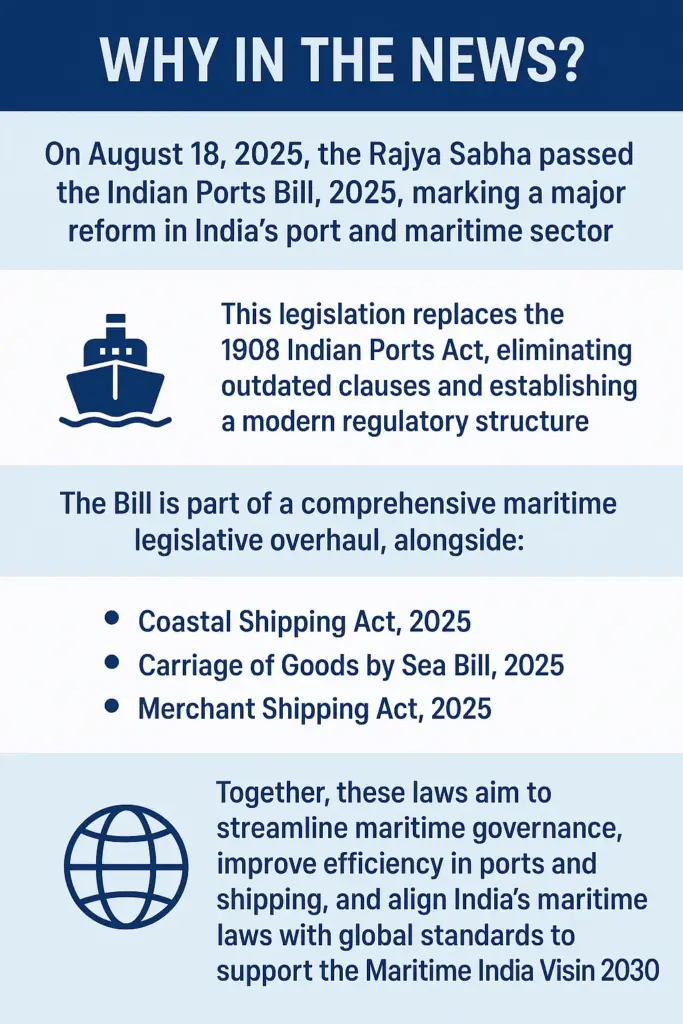September 4, 2025
Indian Ports Bill, 2025
Why in the News?
On August 18, 2025, the Rajya Sabha passed the Indian Ports Bill, 2025, marking a major reform in India’s port and maritime sector.
- This legislation replaces the 1908 Indian Ports Act, eliminating outdated clauses and establishing a modern regulatory structure.
- The Bill is part of a comprehensive maritime legislative overhaul, alongside:
- Coastal Shipping Act, 2025
- Carriage of Goods by Sea Bill, 2025
- Merchant Shipping Act, 2025
Together, these laws aim to streamline maritime governance, improve efficiency in ports and shipping, and align India’s maritime laws with global standards to support the Maritime India Vision 2030.

Key Highlights of the Indian Ports Bill, 2025
Modernisation of Maritime Governance
- Replaced the colonial-era Indian Ports Act, 1908, which had outdated provisions unsuitable for modern port operations.
- Establishes a contemporary regulatory framework for better administration of both major and non-major ports.
Uniform Regulatory Structure
- Creates a single, unified legal structure for:
- Major Ports (like Mumbai, Chennai, Visakhapatnam)
- Non-Major Ports (state-level ports)
- Eliminates overlapping jurisdictions between the Centre and States.
- Encourages ease of doing business in the maritime sector.
Role of State Governments
- Empowers state governments to play a larger role in port development and regulation.
- Enhances cooperative federalism by ensuring coordination between the Union and States in port management.
Environmental and Safety Provisions
- Stronger compliance mechanisms for:
- Pollution control at ports.
- Maritime safety standards for cargo handling and ship operations.
- Aligns with International Maritime Organization (IMO) conventions and global best practices.
Boost to Private Sector Participation
- Simplifies rules for public-private partnerships (PPP) in port development.
- Encourages private investment in logistics, infrastructure, and technology-driven port management.
Digitalisation and Transparency
- Pushes for digitisation of port operations, including:
- E-clearance for vessels.
- Single-window systems for cargo movement.
- Data-driven governance for tracking performance.
Integration with Maritime India Vision 2030
- Supports the government’s target to:
- Double port capacity by 2030.
- Transform India into a leading international center for shipping and logistics.
- Strengthen India’s ranking in the World Bank’s Global Logistics Performance Index (LPI).
Key Concerns and Obstacles in the Indian Ports Bill, 2025:
While the Indian Ports Bill, 2025 is a landmark reform aimed at modernising India’s maritime sector, its implementation will face structural, economic, environmental, and governance-related challenges. These need to be addressed to ensure smooth transition and realisation of the Bill’s objectives.
Federalism and Centre-State Relations:
Overlap of Jurisdictions:
- Both major ports (Central control) and non-major ports (State control) fall under the Bill’s framework.
- Possible disputes may arise between the Union and State governments regarding revenue distribution and administrative authority.
State Autonomy Concerns:
- Some states may perceive this reform as an erosion of their powers, especially those with extensive coastlines like Gujarat, Maharashtra, Tamil Nadu, and Andhra Pradesh.
Coordination Challenge:
- Lack of effective mechanisms for inter-agency and inter-governmental coordination may slow down decision-making.
Transition from Colonial-Era Law:
- Enacted in 1908, the Indian Ports Act has been in operation for over a century.
Challenge of Modernisation:
- Updating institutional structures, training manpower, and upgrading systems to comply with new rules will take time and resources.
Resistance to Change:
- Older port trusts and bureaucracies may resist reforms due to vested interests.
Implementation and Enforcement Gaps:
Capacity Deficit:
- Many non-major ports lack skilled manpower, modern infrastructure, and digital systems required by the new law.
Monitoring Difficulties:
- Ensuring uniform compliance across over 200 minor and intermediate ports is a logistical challenge.
Delay in Rule-Making:
- Even though the Bill lays down broad principles, detailed rules and procedures need to be framed, which could face delays.
Environmental and Sustainability Challenges:
Coastal Ecology at Risk:
- Increased port expansion and shipping activities could lead to mangrove destruction, coastal erosion, and marine biodiversity loss.
Pollution Control:
- Effective implementation of pollution-control measures will require significant investments and strict monitoring.
Global Green Norms Compliance:
- The Bill aligns with International Maritime Organization (IMO) conventions, but many smaller ports lack capacity to meet green shipping requirements such as decarbonisation and ballast water management.
Financial and Investment Concerns:
Funding Gaps:
- Modernising ports and building digital systems require massive investments.
- Smaller states may lack the financial capacity to upgrade ports without central support.
Private Sector Hesitancy:
- Private players may be reluctant to invest if there is policy uncertainty or delays in approvals.
Global Competition:
- India must compete with advanced ports like Singapore, Dubai, and Colombo, which already have world-class facilities.
October 6, 2025
September 24, 2025
September 23, 2025
September 22, 2025
